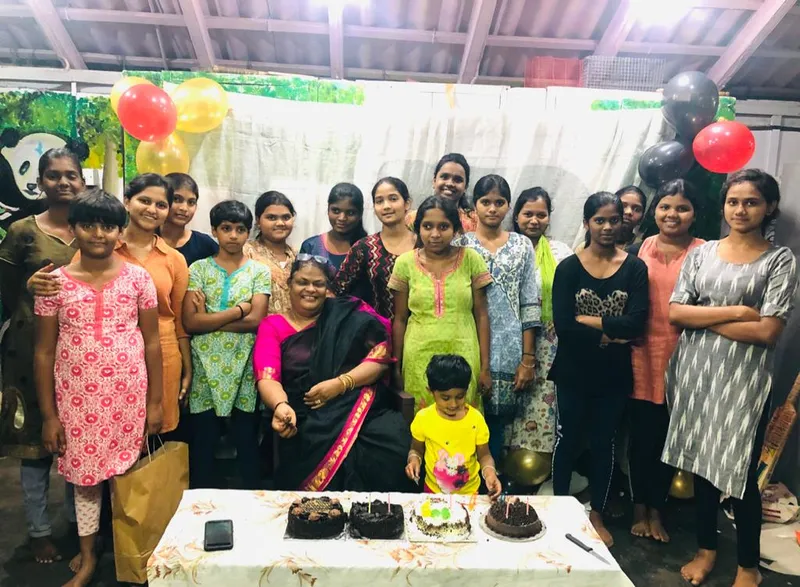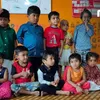Building a brighter future: For 30 years, Sabina Solomon has been caring for orphans in Bengaluru
Sabina Solomon and her family have been looking after the children at Angels Orphanage for over 30 years. But the pandemic has made meeting even their basic needs a challenge
When Sabina Solomon first arrived at a small orphanage tucked away in the bylanes of Bengaluru’s Shivajinagar in 1991, it was to cook meals as a volunteer for the small group of children who lived there. It was a homecoming of sorts for the then 27-year-old Solomon who soon took on the additional responsibility of tutoring the children as well.
Tragedy struck in 1998 when she lost her husband, leaving her to look after three small children – Stalin, Angel, and Samuel – and the orphans who had come to consider her a parent. She decided that she would devote herself to their upbringing.
“When my mother started running the orphanage, there were only five children here. Today, 55 children between the ages of two and 16 live here,” says Stalin, 28, who has joined his mother and sister in the care of the children.

Sabina Solomon with some of the girls at the Angels Orphanage in Bengaluru, before the pandemic. Since the lockdown, they have been facing challenges with meeting the children's daily nutritional needs.
While Stalin is involved with the orphanage full time, 26-year-old Angel helps her mother — who is now diabetic — cook all the meals before leaving for her front-office job at a local educational institute.
Prior to the lockdown, Angel and Sabina would cook the meals for the entire day and the children would be sent to school. The orphanage would sometimes get food from donors, but with the onset of the pandemic, Sabina decided to accept only raw ingredients and cook all the meals at the orphanage to safeguard the children. But that decision brought its own set of challenges.
“When the lockdown was announced, all donations came to an end. We would reach out to our donors for help for funds and ingredients, but for every 100 calls we made, only three or four yielded any results. We only had rice in the storeroom and everything else was over. We had to pawn my mother’s jewellery to get dal, milk, and vegetables. It costs nearly Rs 50-80 a day for each child to provide three square meals and tea and milk in the morning and evening,” says Stalin.
A second chance at life
Providing the children with wholesome nutrition hasn’t been the only challenge. Prior to the lockdown, all the children were attending school.
“Our kids were being sent to five schools in the city. It costs approximately Rs 7 lakh for all 55 students. The money came from individual sponsors and donors. The children were going to both Kannada and English medium schools, and each child’s fees was paid directly to the school by the sponsor and not through us. We believe that once they are educated, they can stand on their own feet. This year, all the students who have written the exam have scored high first division marks,” he says.
During the lockdown, the children have been taking classes thrice a week online, courtesy the Make a Difference Foundation, which has given them laptops for their classes. These are used exclusively for the classes and locked remotely by the NGO at the end of the session.
Many of the children have gone on to have successful careers. “One of our girls Keerti is a doctor, while another Kavya is a manager at a leading fast-food chain. We arrange and conduct marriages of girls who want to settle down after their education. Some of our boys are now studying mechanical engineering.”
When they return to the orphanage at Christmas, Sabina has one criterion. “She asks them to bring some chocolate or small gifts for the children. We don’t take any money from them.”
Everyday challenges
Money, however, is a mounting challenge. Stalin says that it costs nearly Rs 2,350 a month to look after the food, clothing, education, and medical needs of each child. To make matters worse, the lease on their land is expiring and Sabina has to find the funds to renew the lease before she is forced to vacate the premises with her children. A recent fire caused by an electrical fault means the whole wiring needs to be redone to ensure their safety.
A fundraising by a leading platform has helped them tide over for a while, but that money is running out too. But Sabina and her family are optimistic and believe that they will overcome this.
“This is our life’s calling. These children come to us from all over the city because nobody wants them. Our only request to people is to come visit us. Come meet the children and if you like what we do, contribute in any way you want,” he says.
For now, Sabina and her family are living by faith and the hope that things will get better.
“Every deserted person, every orphan should know that there is love here. This is a family. I am lucky to be with them and to be a part of their lives,” she says.
You can find out more about Angels Orphanage here
Edited by Saheli Sen Gupta







